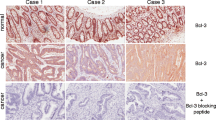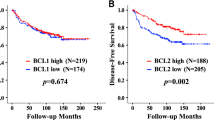Abstract
PURPOSE: This study was undertaken to evaluate the clinical use of Bcl-2, c-Myc, and p53 oncoproteins, either singly or in combination, as prognostic discriminants relative to recurrence and overall survival in patients with Dukes B or C colorectal carcinoma. METHODS: Analyses were made on archival pathology tissues of 48 patients with colorectal cancer. The oncoproteins were localized using commercially available monoclonal antibodies: clone 124 for Bcl-2, 9E11 for c-Myc, and DO-7 for p53. The avidin-biotin peroxidase complex method was used. Patients were followed up for a period of 2 to 36 months. RESULTS: Expression of Bcl-2 and c-Myc was cytoplasmic, whereas nuclear p53 immunoreactivity was localized in the tumor cells. Sixty percent (29/48), 65 percent (31/48), and 37 percent (18/ 48) of the tumors showed overexpression of Bcl-2, c-Myc, and p53 oncoproteins, respectively. Fifty-four percent (18/ 33) and 100 percent (9/9) of moderately and poorly differentiated tumors, respectively, were positive for Bcl-2 (P<0.01). No such correlation was noted for c-Myc and p53 oncoproteins. Univariate analysis showed that patients with Bcl-2 and c-Myc overexpression were associated with poorer overall survival than patients with Bcl-2-negative (P<0.0124) and c-Myc-negative (P<0.036) tumors. In addition, when patients were subgrouped according to Dukes stage, a statistically significant poorer overall survival was observed in Dukes C patients with Bcl-2-positive tumors (P<0.017). Furthermore, multivariate analysis revealed that coexpression of three oncoproteins was predictive of a worse prognosis than for those individuals expressing none of the oncoproteins (P<0.031) and only one positive oncoprotein (P<0.014). CONCLUSION: These findings suggest that oncoprotein coexpression possesses significant prognostic and potential therapeutic value; incorporation of molecular markers into future prospective randomized trials is advisable.
Similar content being viewed by others
References
Fearon ER, Vogelstein B. A genetic model for colorectal tumorogenesis. Cell 1990;61:759–67.
Hague A, Moorghen M, Hicks D, Chapman M, Paraskeva C. Bcl-2 expression in human colorectal adenomas and carcinomas. Oncogene 1994;9:3367–70.
Flohil CC, Janssen PA, Bosman FT. Expression of Bcl-2 protein in hyperplastic polyps, adenomas, and carcinomas of the colon. J Pathol 1996;178:393–7.
Yamaguchi A, Ninomiya I, Ishida T,et al. Immunohistochemical detection of c-myc products in colorectal cancer and proliferative cell rate. Oncology 1992;49:40–4.
Roussel M, Saule S, Lagrou C,et al. Three new types of viral oncogene of cellular origin specific for haematopoietic cell transformation. Nature 1979;281:452–5.
Sheiness D, Bishop JM. DNA and RNA from uninfected vertebrate cells contain nucleotide sequences related to the putative transforming gene of avian myelocytomatosis virus. J Virol 1979;31:514–21.
Starzynska T, Bromley M, Ghosh A, Stern P. Prognostic significance of p53 overexpression in gastric and colorectal carcinoma. Br J Cancer 1992;66:558–62.
Bosari S, Viale G, Bossi P,et al. Cytoplasmic accumulation of p53 protein: independent prognostic indicator in colorectal adenocarcinomas. J Natl Cancer Inst 1994;86:681–7.
Dukes CE, Bussey HJ. The spread of rectal cancer and its effect on prognosis. Br J Cancer 1958;12:309–20.
Morson BC, Sobin LH. International histological classification of tumors. Vol. 15. Geneva: World Health Organization, 1976:56–65.
Bhatavdekar JM, Patel DD, Giri DD,et al. Comparison of plasma prolactin and CEA in monitoring patients with adenocarcinoma of colon and rectum. Br J Cancer 1992;66:977–80.
Kaplan EL, Meier P. Non parametric estimation from incomplete observations. J Am Stat Assoc 1958;53:457–81.
Ofner D, Riehemann K, Maier H,et al. Immunohistochemically detectable Bcl-2 expression in colorectal carcinoma: correlation with tumor stage and patient survival. Br J Cancer 1995;72:981–5.
Baretton GB, Diebold J, Christoforis G,et al. Apoptosis and immunohistochemical Bcl-2 expression in colorectal adenomas and carcinomas: aspects of carcinogenesis and prognostic significance. Cancer 1996;77:255–64.
Sato K, Miyahara M, Saito T, Kobayashi M. c-myc mRNA overexpression is associated with lymph node metastasis in colorectal cancer. Eur J Cancer 1994;30A:1113–7.
Jones DJ, Ghosh AK, Moore M, Schofield PF. A critical appraisal of the immunohistochemical detection of the c-myc oncogene product in colorectal cancer. Br J Cancer 1987;56:779–83.
Grewal H, Guillem JG, Klimstra DS, Cohen AM. p53 nuclear overexpression may not be an independent prognostic marker in early colorectal cancer. Dis Colon Rectum 1995;38:1176–81.
Mulder J-W, Baas IO, Polak MM, Goodman SN, Offerhaus GJ. Evaluation of p53 protein expression as a marker for long-term prognosis in colorectal carcinoma. Br J Cancer 1995;71:1257–62.
Yamaguchi A, Kurosaka Y, Fushida S,et al. Expression of p53 protein in colorectal cancer and its relationship to short-term prognosis. Cancer 1992;70:2778–84.
Author information
Authors and Affiliations
Additional information
Read at the meeting of the Indian Society of Oncology in collaboration with Indo American Cancer Congress Inc. U.S.A., at Lucknow, India, March 1 to 3, 1996.
About this article
Cite this article
Bhatavdekar, J.M., Patel, D.D., Ghosh, N. et al. Coexpression of Bcl-2, c-Myc, and p53 oncoproteins as prognostic discriminants in patients with colorectal carcinoma. Dis Colon Rectum 40, 785–790 (1997). https://doi.org/10.1007/BF02055433
Issue Date:
DOI: https://doi.org/10.1007/BF02055433




